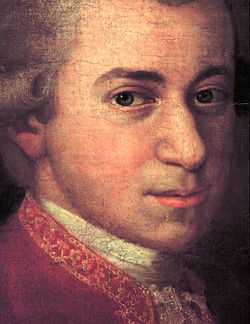Biographies of Mozart
Wolfgang Amadeus Mozart died after a short illness on 5 December 1791. His reputation as a composer, already strong during his lifetime, rose rapidly in the years after his death, and he became (as he has remained to this day) one of the most celebrated of all composers.
Shortly after Mozart's death, biographers began to piece together accounts of his life, relying on the testimony of those still living who knew him, as well as surviving correspondence. The creation of Mozart biographies has been an activity of scholars ever since.
Early biographers
Friedrich Schlichtegroll was a teacher and a scholar who published Mozart's obituary in 1793. The obituary was part of a volume of obituaries referred to as Nekrolog. The two had never met. Most of the information was obtained from Nannerl, Mozart's sister, and Johann Andreas Schachtner, a friend of the family in Mozart's early years. Therefore what Schlichtegroll knew and wrote about was the period before Vienna.
Franz Xaver Niemetschek was a citizen of Prague, a teacher and writer. Niemetschek allegedly met with Mozart and claimed to have been acquainted with Mozart's friends in Prague. After Mozart's death, his widow Constanze sent Carl, the elder son, to live with him from 1792-97. Through these relationships with the family, Niemetschek gathered the information needed to write a biography of Mozart. His main source was Constanze and Mozart's friends in Prague. Therefore his emphasis was on Mozart's years in Vienna and his many trips to Prague. Based on research by Austrian scholar Walther Brauneis, much doubt has recently been cast on the veracity of Niemetschek's claim that he actually made Mozart's personal acquaintance.
Friedrich Rochlitz was the editor of the Allgemeine Musikalische Zeitung (AMZ), a journal published by Breitkopf & Hartel. Motivated by the wish to publicize the company's edition in progress of the composer's works, he published a number of anecdotes about Mozart, many of them vivid and entertaining. However, since the research of Solomon 1991, Mozart scholars have considered Rochlitz's stories so contaminated by Rochlitz's own fictional additions that they must be considered completely unreliable.[1] They continue to play a role in forming the popular image of the composer.
I. T. F. C. Arnold, an author of Gothic novels, wrote Mozart's Geist, published in Erfurt in 1803. According to William Stafford, the work is "almost entirely plagiarized from Schlichtegroll, Niemetschek, and perhaps Rochlitz";[2] Stafford does not trust any other material that appears in this work, though he notes that some of it was adopted for appearance in later Mozart biographies.
Georg Nikolaus Nissen was the second husband of Mozart's wife Constanze. Both he and Constanze had a strong interest in Mozart biography. They were able to pursue this interest following Nissen's retirement from the Danish civil service, when the couple moved to Salzburg (where Mozart had lived for much of his life up to age 25). Much of the Nissen biography included what had been previously written by Schlichtegroll, Niemetschek, and Rochlitz, but Nissen also had access to a great number of Mozart family letters given him by Nannerl. Unfortunately, Nissen died in 1826 having only written a small portion of the work, and it was completed (1828) from his notes by others.[3] Stafford (1993) writes: "Sometimes Nissen corrects the chunks he borrows, and occasionally he tells the reader that he has done this ... unfortunately, he does not always correct and revise in this way. Assembling his narrative with scissors and paste, he allows contradictions to creep in."
Vincent and Mary Novello made a pilgrimage to Salzburg in 1829, to visit Mozart's surviving relatives and to provide financial support to Nannerl (whom they mistakenly imagined to be impoverished).[3] They did interviews of Nannerl, Constanze, and Mozart's sister-in-law Sophie Haibel, but never converted this material into a biography. The diaries were discovered and published in 1955.[4]
Later biographies
A very important Mozart biography was that published in 1856 by Otto Jahn. Jahn brought a new standard of scholarship to the field. It is still active as a scholarly document, circulating in versions revised first by Hermann Abert, then by the contemporary Mozart scholar Cliff Eisen.
The Mozart scholar Otto Erich Deutsch produced (English version 1965) a widely cited "documentary" biography, in which most of the material is reprinted documentary evidence, tied together by Deutsch's own commentary.
A great number of additional biographies exist, of which notably recent ones include those by Volkmar Braunbehrens, Maynard Solomon, and Ruth Halliwell.
Notes
References
- Deutsch, Otto Erich (1965). Mozart: A Documentary Biography. Peter Branscombe, Eric Blom, Jeremy Noble (trans.). Stanford: Stanford University Press. ISBN 978-0-8047-0233-1. OCLC 8991008.
- Halliwell, Ruth (1998). The Mozart Family: Four Lives in a Social Context. New York: Clarendon Press. ISBN 978-0-19-816371-8. OCLC 36423516. Contains extensive discussion of the origin of the first three Mozart biographies.
- Solomon, Maynard (1991). "The Rochlitz Anecdotes: Issues of Authenticity in Early Mozart Biography". In Eisen, Cliff. Mozart Studies. Oxford: Clarendon Press. ISBN 978-0-19-816191-2. OCLC 24429446.
- Solomon, Maynard (1995). Mozart: A Life (1st ed.). New York: HarperCollins. ISBN 978-0-06-019046-0. OCLC 31435799.
- Stafford, William (1993). The Mozart Myths: A Critical Reassessment. Stanford: Stanford University Press. ISBN 0-8047-2222-6. OCLC 59909848.
| ||||||||||||||||||||
